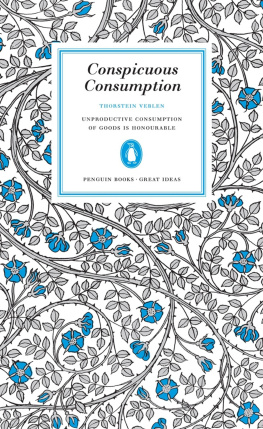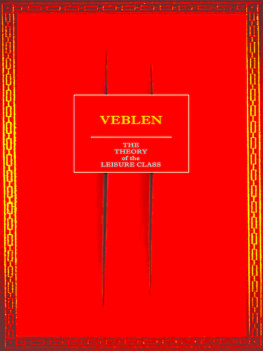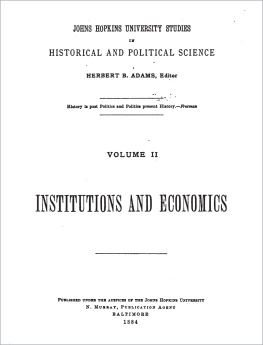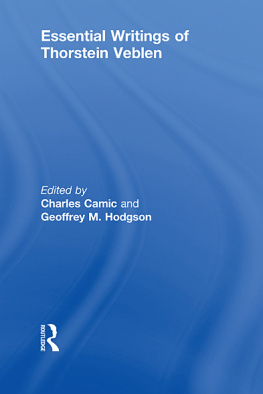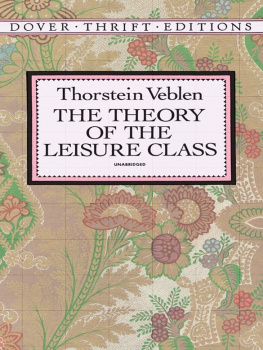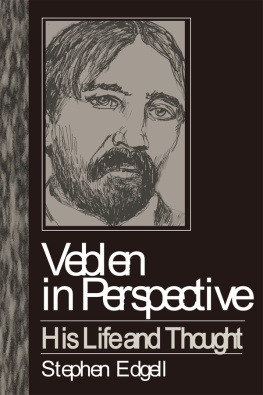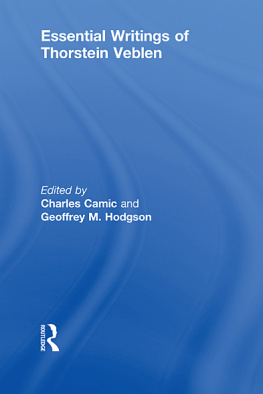THE THEORY OF BUSINESS ENTERPRISE
THORSTEIN VEBLEN

This 2011 edition published by Barnes & Noble, Inc.
All rights reserved. No part of this publication may be reproduced, stored in a retrieval system, or transmitted, in any form or by any means, electronic, mechanical, photocopying, recording, or otherwise, without prior written permission from the publisher.
Barnes & Noble, Inc.
122 Fifth Avenue
New York, NY 10011
ISBN: 978-1-4114-6468-1
PREFACE
I N respect of its point of departure, the following inquiry into the nature, causes, utility, and further drift of business enterprise differs from other discussions of the same general range of facts. Any unfamiliar conclusions are due to this choice of a point of view, rather than to any peculiarity in the facts, articles of theory, or method of argument employed. The point of view is that given by the business man's work,the aims, motives, and means that condition current business traffic. This choice of a point of view is itself given by the current economic situation, in that the situation plainly is primarily a business situation.
A much more extended and detailed examination of the ramifications and consequences of business enterprise and business principles would be feasible, and should give interesting results. It might conceivably lead to something of a revision (modernization) of more than one point in the current body of economic doctrines. But it should apparently prove more particularly interesting if it were followed up at large in the bearing of this modern force upon cultural growth, apart from what is of immediate economic interest. This cultural bearing of business enterprise, however, belongs rather in the field of the sociologist than in that of the professed economist; so that the present inquiry, in its later chapters, sins rather by exceeding the legitimate bounds of economic discussion on this head than by falling short of them. In extenuation of this fault it is to be said that the features of general culture touched upon in these chapters bear too intimately on the economic situation proper to admit their being left entirely on one side.
Of the chapters included in the volume, the fifth, on Loan Credit, is taken, without substantial change, from Volume IV of the Decennial Publications of the University of Chicago, where it appears as a monograph.
CHAPTER I
INTRODUCTORY
T HE material framework of modern civilization is the industrial system, and the directing force which animates this framework is business enterprise. To a greater extent than any other known phase of culture, modern Christendom takes its complexion from its economic organization. This modern economic organization is the "Capitalistic System" or "Modern Industrial System," so called. Its characteristic features, and at the same time the forces by virtue of which it dominates modern culture, are the machine process and investment for a profit.
The scope and method of modern industry are given by the machine. This may not seem to hold true for all industries, perhaps not for the greater part of industry as rated by the bulk of the output or by the aggregate volume of labor expended. But it holds true to such an extent and in such a pervasive manner that a modern industrial community cannot go on except by the help of the accepted mechanical appliances and processes. The machine industriesthose portions of the industrial system in which the machine process is paramountare in a dominant position; they set the pace for the rest of the industrial system. In this sense the present is the age of the machine process. This dominance of the machine process in industry marks off the present industrial situation from all else of its kind.
In a like sense the present is the age of business enterprise. Not that all industrial activity is carried on by the rule of investment for profits, but an effective majority of the industrial forces are organized on that basis. There are many items of great volume and consequence that do not fall within the immediate scope of these business principles. The housewife's work, e.g., as well as some appreciable portion of the work on farms and in some handicrafts, can scarcely be classed as business enterprise. But those elements in the industrial world that take the initiative and exert a far-reaching coercive guidance in matters of industry go to their work with a view to profits on investment, and are guided by the principles and exigencies of business. The business man, especially the business man of wide and authoritative discretion, has become a controlling force in industry, because, through the mechanism of investments and markets, he controls the plants and processes, and these set the pace and determine the direction of movement for the rest. His control in those portions of the field that are not immediately under his hand is, no doubt, somewhat loose and uncertain; but in the long run his discretion is in great measure decisive even for these outlying portions of the field, for he is the only large self-directing economic factor. His control of the motions of other men is not strict, for they are not under coercion from him except through the coercion exercised by the exigencies of the situation in which their lives are cast; but as near as it may be said of any human power in modern times, the large business man controls the exigencies of life under which the community lives. Hence, upon him and his fortunes centres the abiding interest of civilized mankind.
For a theoretical inquiry into the course of civilized life as it runs in the immediate present, therefore, and as it is running into the proximate future, no single factor in the cultural situation has an importance equal to that of the business man and his work.
This of course applies with peculiar force to an inquiry into the economic life of a modern community. In so far as the theorist aims to explain the specifically modern economic phenomena, his line of approach must be from the business man's standpoint, since it is from that standpoint that the course of these phenomena is directed. A theory of the modern economic situation must be primarily a theory of business traffic, with its motives, aims, methods, and effects.
CHAPTER II
THE MACHINE PROCESS
I N its bearing on modern life and modern business, the "machine process" means something more comprehensive and less external than a mere aggregate of mechanical appliances for the mediation of human labor. It means that, but it means something more than that. The civil engineer, the mechanical engineer, the navigator, the mining expert, the industrial chemist and mineralogist, the electrician,the work of all these falls within the lines of the modern machine process, as well as the work of the inventor who devises the appliances of the process and that of the mechanician who puts the inventions into effect and oversees their working. The scope of the process is larger than the machine. In those branches of industry in which machine methods have been introduced, many agencies which are not to be classed as mechanical appliances, simply, have been drawn into the process, and have become integral factors in it. Chemical properties of minerals, e.g., are counted on in the carrying out of metallurgical processes with much the same certainty and calculable effect as are the motions of those mechanical appliances by whose use the minerals are handled. The sequence of the process involves both the one and the other, both the apparatus and the materials, in such intimate interaction that the process cannot be spoken of simply as an action of the apparatus upon the materials. It is not simply that the apparatus reshapes the materials; the materials reshape themselves by the help of the apparatus. Similarly in such other processes as the refining of petroleum, oil, or sugar; in the work of the industrial chemical laboratories; in the use of wind, water, or electricity, etc.


